|
UWM Theatre alum Michael Cotey has created a nationwide program to tap into the voices of high school students from all over the country. #ENOUGH is a program of shorts written by those growing-up in an increasingly dangerous world of mass shootings and increased awareness of police-related assault and homicide. Many scripts were submitted. A few chosen scripts are being performed by theatre groups all over the country. Last night Sturgeon Bay’s Third Avenue Playhouse presented a live reading of the shorts on YouTube. The opening short Loaded Language started with a group of students talking about plans and strategies on how best to survive a shooting at their school. The dialogue is written by high school senior Elizabeth Shannon. In an earlier era this would have been morbid idle thought in a study hall, but in the modern world this is practical planning for a potential tragedy. It’s a stark introduction to the program. In the second scene an offhand remark about a troubled classmate bends the talk of potential tragedy into active drama. Former Milwaukee Chamber Theatre Producing Artistic Director C. Michael Wright directed the second short on the program: Debkanya Mitra’s Malcom. A quartet of voices remember one person...a victim of a police shooting. There’s real anger and frustration fused into the story of one life lost in police/civilian altercation that has become all too tragically common. It’s a very vivid character sketch that is delivered before the account of his death. It’s a very powerful moment. Ms. Martin’s Malaise follows the story of Malcolm. A teacher is juxtaposed against students, reports of a firearm and the fates themselves. Written by Adelaide Fisher, it’s a drama with intensity that is amplified by the videoconference format of the show. It’s just people. With no other distractions, the complexity of issues surrounding firearms in the US get a striking close-up in a provocative, little drama. Probably the most memorable short on the program was California Sophomore Sarah Schecter’s Hullabaloo. Milwaukee’s Ryan Schabach playing a showman named Hunter in a Wild Bill-style political satire on the bloody history of the United States’ relationship with firearms. There’s a charismatic poetry about it that engages the slicing satire that feels bombastically oversimplified in places, but Schecter casts quite a bit of light on aspects of the past that aren’t often explored in pop entertainment formats. Schecter levels a suitably potent photonic cannon at the history of guns in America. It’s a clever contrast to the heaviness of much of the rest of the program. Of all the shorts on the program, this one feels like it might be the one that would feel most dynamic expanded into a feature-length show. The history of this country’s relationship with guns is a long and sordid one. It’s a history that needs to be seen in all its vicious ugliness. #ENOUGH will be presented in a hybrid production online from a few different theatre groups from all over the country will be presented on Broadway on Demand. For more information on that and the ambitious program, visit #ENOUGH online.
0 Comments
It’s December 24, 1615. Shakespeare is hanging out at the Windmill Inn in Stratford upon Avon. Naturally a modern actor would find himself walking into the place. He had just been at a post-show talkback in Illinois. Playwright/actor/Milwaukee theatre veteran John Kishline plays Shakespeare himself in a staging of the play that’s being presented by Door Shakespeare. Kishline is joined by a talented cast of actors in a drama that’s presented videoconference-style with each actor appearing in front of the same backdrop suggesting a 17th century tavern. In the course of the play’s sole hour onscreen, the staged reading format of the show gradually melt into the background. The first actor making unexpected meeting with Shakespeare is played by Neil Brookshire. He’s charismatic as an actor suddenly found himself in the presence of one of the most legendary writers in history. He performs a bit as Friar Lawrence with Shakespeare before a couple of fellow actors enter. Cassandra Bissel and Deborah Clifton play the other two contemporary actors entering the tavern to inadvertently stumble into the legend. Bissel is particularly warm as an actor suddenly in awe at Shakespeare’s presence. Before long, the others perform a little bit of Shakespeare’s work with him. Director Michael Stebbins has done a good job of finding the perfect minimalist framing for the drama. The simple backdrop works well enough. Stebbins himself reads the stage directions. Not much longer later, Duane Boutté appears as the final member of the modern cast to run into Shakespeare. Kishline’s script serves as a fun backdrop for a simple reading of excerpts from Shakespeare. Bissel, Boutté, Clifton and Brookshire carry the Shakespeare. Delivering Shakespeare in videoconference is always difficult, but Door Shakespeare makes it work. The ensemble’s greatest victory, though, lies in bringing the distinct social atmosphere of a group of actors to the screen. It’s a scripted dialogue over videoconference, but the ensemble brings it all together like it’s a casual soiree between actors after a talkback. Kishline’s dialogue is stiff in places as he dives into history with Shakespeare. The ensemble does a brilliant job of keeping it all very light and social even on those few occasions when Kishline’s script feels awkwardly historical. An ancient playwright and a group of actors spend some time together on a video screen. It’s a fun bit of light and classy entertainment that might inhabit a cozy corner of any holiday get-together on the journey out to the middle of the month. Outside of COVID, Kishline’s script has great potential to be a holiday standard. Classy snippets of Shakespeare would be a welcome alternative to traditional holiday fare in almost any theatre market. Casts of contemporary actors meeting Shakespeare could be adapted to fit the market. Here it’s Neil and Cassie and Deborah and Duane, but it could just as easily be any othe quartet in any other region interacting with Shakespeare for a holiday show set on Christmas Eve in 1615. Kishline’s script is a fun diversion from the usual type of thing that makes it to stages for the holidays. Dream Upon Avon is available for free online through December 13. For more information, visit Door Shakespeare online. The coronavirus continues unabated. A lot of local theatre talent has been sitting around waiting as patiently as possible for an opportunity to perform. Theatre has been extremely difficult to transfer to the internet in the age of COVID. There have been numerous attempts to bring the feel of theatre to the screen. Some attempts have proven to be better than others. The Masked Collective did a truly admirable job of delivering a completely new, locally-written drama to the screen in the premiere of No “Serious Stuff.” The two-person drama written by local playwright Emily Elliott is endearingly captivating. It’s a one-hour conversation between two friends over Zoom. Sarah Zapiain and Deena Turkomani play a couple of friends who haven’t talked in a long time. Zapiain cleverly treads the dichotomy of a self-confident vulnerability as Billie. It was Billie’s idea for the two to get together for a video chat. She has a list of possible topics that both could discuss if anything becomes too awkward. Turkomani is charmingly scattered as her friend Parker, who has a very rough series of months behind her. Things start-off warm and pleasantly social, but they gradually descend in to emotional territory far too murky for any list of topics to adequately defend against. Director Emmie D’Amico has done a hell of a job pulling together a very organic feel between two actors who are never allowed to be seen together directly. It’s all one scene. It’s a one-hour video chat that plays out in realtime. All that’s ever revealed about the two is revealed directly in the course of their conversation. It’s simple and refreshing. Zapiain and Turkomani have developed a very organic emotional dynamic. Elliott has crafted dialogue that feels very real. There are very few moments in the course of the drama that feel like they’re scripted. D’Amico has allowed for poignant silences to occasionally punctuate something that has a great sense of depth and vitality about it. There’s a kind of a murky emotional power in a conversation that’s written entirely to be performed in video chat. Serious two-person dramas onstage have so many distractions. No “Serious Stuff” is a crushingly intimate portrait of two people. It’s rare that two actors are looking directly at the audience in a talking-heads format for an entire hour in an earthbound emotional drama. It’s been so very, very difficult for theatre to deal with the challenges of internet drama. Emily Elliott’s No “Serious Stuff” fully embraces the opportunities presented by live online drama. The recorded video of The Masked Collective’s No “Serious Stuff” is now available on YouTube. The video can't be embedded in this page, but it CAN be viewed here. (The show is under an hour. It’s a two-hour video with a long title card. The actual show starts at the 01:05:36 mark.) The National Weather Service predicts a possible opening night for the snow season this evening. With only 0-3 inches expected, it’s not going to be a huge opening near the lake, but it’s a very, very busy week for Milwaukee-related theatre openings. Tonight there’s something of an inadvertent double feature of theatre shows. Local Playwright Emily Elliott's No Serious Stuff opens for John Kishline's Dream Upon Avon. Here’s a look at items available for the next 4 days: No...seriously No Serious Stuff debuts in just three hours. The Masked Collective is providing the show’s big debut online for a suggested $7 or more donation that is “encouraged by not required.” It’s live on YouTube. Milwaukee playwright Emily Elliott presents the story of Parker and Billie: a couple of people who haven’t spoken in a year. Things didn’t end well for them. They agree to a FaceTime call to discuss things...sounds like a perfect idea for videoconference-style theatre. The show opens at 6:00 pm on YouTube. For more information, visit the show’s Facebook events page. Door Shakespeare will be presenting an online presentation of a holiday play by Milwaukee theatre veteran John Kishline. It’s a reading of Kishline’s Dream Upon Avon. It’s Christmas Eve and Shakespeare is hanging out at his favorite pub. He is visited be a series of people...each with unrealized dreams of unanswered questions. Kishline is joined by a remarkable cast including Cassandra Bissell, Duane Boutte, Neil Brookshire and Deborah Clifton. The reading takes place Dec. 11 (tonight) and 12 at 7pm and Dec. 13 at 5pm. The show is free. For more information, visit Door Shakespeare online. Voices Found Repertory’s Mission: Audition event takes place tomorrow afternoon. The next in the actor’s audition workshop series runs 4:30 pm-7:30 pm. Tomorrow VFR’s Jessica Trznadel is joined by guest Jennifer Vosters for an audition workshop for contemporary monologues. They’re looking to provide feedback for modern monologues of 2 minutes’ length. (Anything written after 1920.) It’s $10 for a 20-minute individualized workshop. As of this post, there are still two slots left for the workshop. For more information, visit the sign-up site. Next Monday, The Third Avenue Playhouse presents #ENOUGH--a program of 10-minute plays that address the issue of gun violence. All the plays are written by teens. The free program will be broadcast online. TAP’s readings of the winning plays go live Monday, May 14th at 7pm. For access to the show, visit the show’s Facebook Events page.
Considered to be Shakespeare’s first play, Two Gentlemen of Verona feels a bit embryonic in many ways. This makes it a fun show to watch teens perform in. The romantic comedy has fresh honesty in the presence of people just beginning to relate to those emotions expressed in the script. This month First Stage’s Young Company shows that it’s also kind of a brilliant choice for a Zoom-based online performance format. There’s a vivid connection between ensemble, camera and audience which eliminates everything but the very nature of human action and interaction. And there are some beautiful performances in the show. Director Marcella Kearns has kept the production simple. Characters appear as talking heads in front of black backgrounds. Given the crazy nature of Shakespearian romance, this could come across in a way that might feel unpleasantly surreal, but the Young Company has a firm and passionate hold on the underlying humanity of the script to keep the production from slipping into abstract, soullessly disembodied iambic pentameter. The format allows for a breathtaking portrait of the agony and ecstasy of young love in all its many moods. It’s restless and it’s anxious and it’s enraptured and it’s thoughtless and it’s selfish and it’s so much else. Eloise Field cascades through an impressive range of emotions as Julia, a lady of Verona who finds herself very attracted to a guy named Proteus. The object of her love is a very problematic character on a few different levels. Liam Jeninga does an admirable job of keeping Proteus’ passions earnest even as he’s being a total jerk to Julia. A thoughtfully tender Zachary Nowacek is allowed more of a traditional romantic hero presence in the role of Proteus’ friend Valentine. Proteus falls for another lady and casually cast aside all interest in Julia. The new woman is named Silvia. Silvia is played with sharply expressive eyes and a very engaging heart by Madison Uphoff. More so than any other character in the play, Julia is a victim. Field is crushingly endearing in the role of a woman who shows great strength in the face of victimization. Kearns allows her and the unwitting weapon of her victimization a moment at the end of the play. Field and Uphoff embrace the two most emotionally dramatic roles in the play. Kearns finds a clever framing for the light comedy of Proteus’ servant Launce and his dog Crab. Nicholas Hollenbeck plays Launce in one window as a soulful brown dog named Loki plays Crab in a neighboring window. In an era when the image of a Zoom meeting is all too familiar, the. simple act of placing a canine actor in front of a camera and labeling him at the bottom right of the window is clever every time it shows-up onscreen. Sometimes it’s the littlest things that add immeasurably to the memorability of a production. First Stage Young Company’s production of Two Gentlemen of Verona is available through Dec. 14. For more information, visit First Stage online. |
Russ BickerstaffArchives
July 2024
Categories |

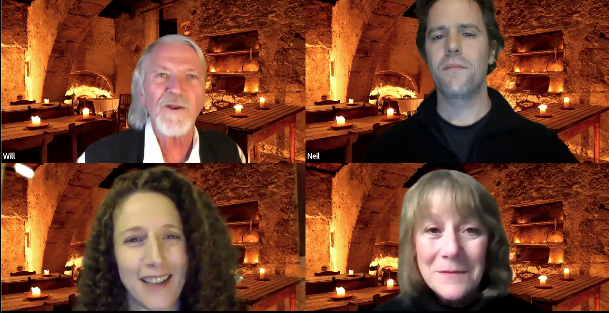


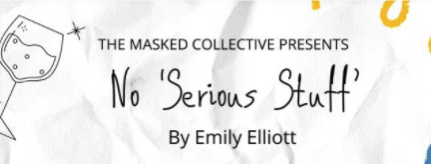

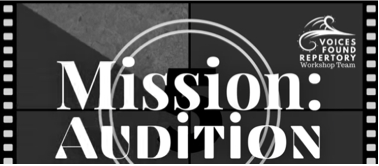

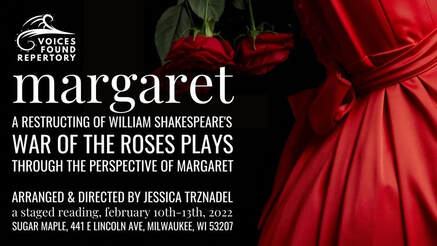
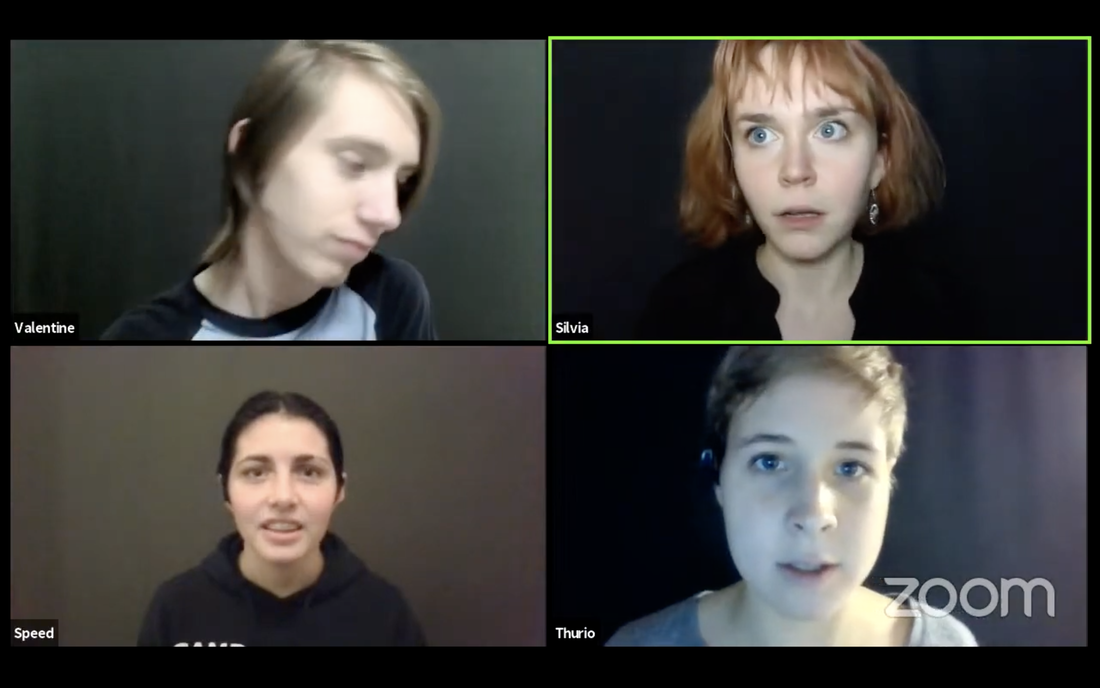
 RSS Feed
RSS Feed
